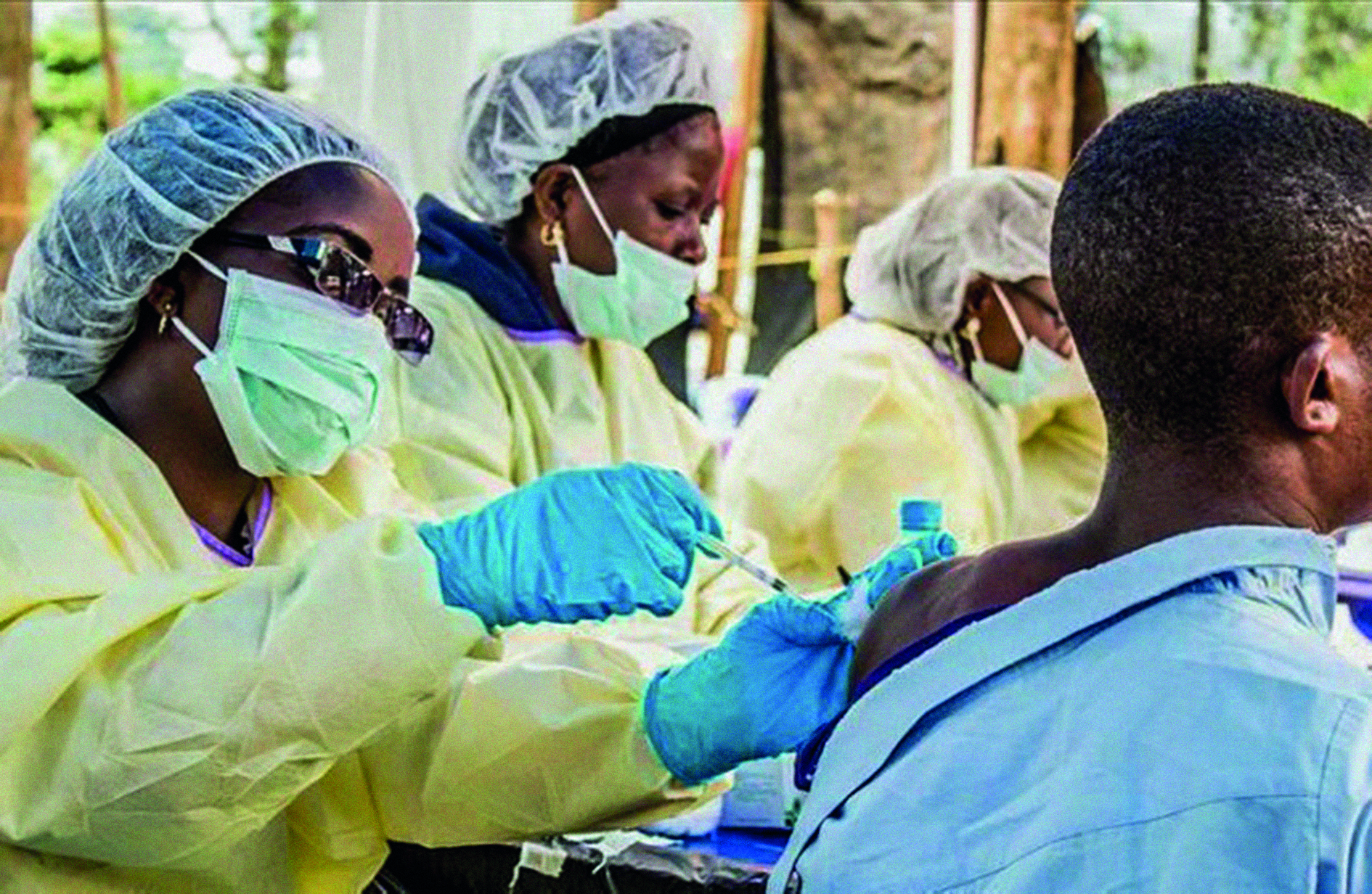The poor of the world expect: Who is going to take the multinationals away ownership of vaccines for COVID-19?
- Nine out of ten people in the world’s poorest countries could run out of the COVID-19 vaccine by 2021. Of the 100 vaccines sold by pharmaceutical corporations, 53 were acquired by rich countries, including the Basques, although they accounted for only 14% of the global total. By the end of the year, there will be no vaccines in poor nations, but in the richest ones, they will have enough to vaccinate every citizen three times.

At the beginning of the year, in the third COVID-19 attack, several humanitarian organizations, including Amnesty International, have launched an alert call denouncing that by the end of the year the 70 poorest countries in the world will have nine out of ten unvaccinated, and calling, as governments, on the pharmaceutical industry to produce and distribute enough vaccines to reach all the world's citizens.
Mohga Kamal Yani of the People’s Vaccine Alliance, one of the signatories, said that rich countries will receive over the year the medicines needed to vaccinate all their citizens not once but three times, also in the case of Canada, and meanwhile, in the poorest countries they will not have to immunise – nor the most vulnerable professionals in the fight against COVID-19. “In the current system,” he said, pharmaceutical companies acquire public funds for their research, but then have exclusive rights to the medicines obtained, keeping their technology secret to increase their economic benefits. This can lead to the loss of many lives.”

The patch is called ‘Covax’
Newly declared the pandemic, in April 2020, the World Health Organization (WHO) created a mechanism called Covax to address the impotence of developing countries. In addition to WHO, various public and private institutions, including the foundation of Bill and Melinda Gates, participate in Covax. The rich know how to lay eggs in all baskets, both in the companies that are going to produce an expensive drug and in philanthropic operations to support some of the poorest who are left without paying the price.
Covax has already raised $2.4 billion from public and private donors, but it lacks nearly as many to reach the $4.6 billion that are the minimum targets. The distribution of joint and several vaccines was due to begin this February, but it was not expected – the calculation is official – that the solidarity doses distributed by the end of 2021 will exceed 2 billion. As each vaccination requires in most cases two doses… accounts do not go well, at least to control the pandemic if 70% of the 7.8 billion people on planet Earth need to be vaccinated, according to the WHO over and over again.

As the Covax treaty cannot solve the problem with public-private charity, 100 countries have proposed something more radical in the movement launched by India and South Africa: That the World Trade Organization (WTO) repeals patent and intellectual property regulations in relation to COVID-19, so that, as drugs, remedies and vaccines are obtained to deal with the pandemic, technology and information from them is accessible to all, opening the way to more countries and companies producing vaccines and other products.
The United States, the United Kingdom and other more powerful countries have been against law reform. The WTO, the precursor of neoliberal globalisation, has created a light mechanism to calm the concerns of the poor: the temporary voluntary renunciation of their rights by patent holders of these new drugs. It has soon been seen as nothing more than an improvised gesture, as a single pharmaceutical corporation has not bitten the desire to show good-hearted charity.
Now, in the context of the demand launched by India and South Africa, progressive and humanitarian organisations, including Amnesty International, Oxfam and so on, want to give impetus to the proposal for patent liberalisation. From the Swiss organisation Public Eye, one of the signatory organisations of the campaign, Patrick Durisch has argued the importance of the measure: “This patent derogation would help us to gain time that is worth gold at the moment and to multiply the capacity of anti-COVID-19 tools to respond to unresolved needs in many areas of the world.”

Who can sunbathe?
The People’s Vaccine coalition, which claims that the COVID-19 vaccine should be in the public domain worldwide: “Without patents: the vaccine of citizenship, not the vaccine of economic benefits. We do not want to return to ‘previous normality’”. As an example, Jonas Salk, who invented the vaccine for terrible polio in 1952, has been praised. They once asked Dr. Salk, who had gained a huge reputation, who was the owner of that vaccine and he: “People. There are no patents. Or could you patent the sun?"
The director of Global Justice Now, Nick Dearden, has summarized what is at stake in the article Big Pharma’s finest hour (“The Most Glorious Time in the Pharmaceutical Industry”). According to Dearden, COVID-19 vaccines allow these companies to improve their profits, but above all, to clean up their public image, stained by so many scandals.

If we do not face the Big Pharma model – Nick Dearden will speak in the following lines – the coronavirus will continue to spread throughout the world, deepening global inequality and, at the same time, giving the virus the opportunity to mutate and make us more dangerous, ultimately conditioning our future (which is in Britain).
We must not forget, on the other hand, that the new vaccines have been achieved thanks to the large amounts of public money invested in them. In some cases, such as the Moderna company, it has been financed almost entirely with public money, but the intellectual property of the product obtained has been left in private hands.
Pharmacy is one of the most profitable industries in the world. Specifically, among the top six companies that have participated in the COVID-19 vaccine race (except Moderna, which is the new company), there were 266 billion dollars of revenue in 2019 and 46 billion profits. The PFIZER, which has managed to be the leader, has had higher revenues than Kuwait or Malaysia, which was among the 30 most profitable companies in the world in 2019, with revenues of USD 52 billion, profits of EUR 16 billion.
Big Pharma has made it so rich thanks to the monopoly that the World Trade Organisation gives them on their medicines for 20 years with patent and intellectual property treaties. They can increase the prices of new drugs on demand and make them prevail in public health, with the enormous influence they exert on doctors and other professionals. “However,” says Director Global Justice Nowko, this monopoly system has become an inconvenience to promote long-term research. The investigation of the necessary new drugs is carried out by the Big Pharma by injecting public money massively, but then it keeps intellectual property and the monopoly of management in its hands and continues to bring huge benefits to its real business, buying new companies and keeping stock prices up. Big Pharma focuses its research on the chronic diseases of people who have money to pay for new treatments. They leave society without medicines for the diseases of people who do not have money to pay for them or, like antibiotics, without the medicines we urgently need. This system is currently stuck at its core to the thinking of Big Pharma.”

Justice versus concern for globalization
And the rest of the researchers, whether they're politicians or researchers or academics, dance in the melody that oligopolies give them. The vaccine developed by the University of Oxford, at first, had no exclusivity or royalty. The director of the Jenner Institute, who was conducting an investigation inside Oxford, responded to the journalists who asked him: “As far as I am concerned, I do not believe that in a time of pandemic I should have an exclusive license.” However, they soon changed the deal and issue with AstraZeneca: the deal has been based on exclusivity and, although the company says it will not take any benefit, it has not shown contract details or a concrete calculation of the studies to get the vaccine.
For the director of Global Justice Now, the coronavirus allows us to produce “resettable” drugs, disrupting global patent standards, as demanded by South Africa and India, or at least by concluding an open-source (open source) type treaty on coronavirus medical research. On these kinds of solutions we could create and share medicines, as well as for diseases beyond the pandemic. “If we consider it normal that hospitals and clinics, Dearden says, are controlled by the public authorities, why shouldn’t the medicines used in them be the same way? If our health services are important enough not to leave them in the hands of the markets, we must conclude that the study and development of the drugs that cure us must go in the same package.”
.jpg)
Pfizer was the first to respond from the pharmaceutical oligopoly to these new proposals for the creation of a patent free research and production treaty in May of last year, by his chief executive, Albert Bourla: “In these times, talking about that is absurd… and also dangerous.” It is understood that, knowing that in 2021 Pfizer expects to make sales of $13 billion with the COVID-19 vaccine.
Will the patent release campaign carried out by poor countries and grass-roots movements succeed? The reader will have no great reason to be optimistic, seeing how the very logic of the pandemic has often weakened and buried the anti-neoliberal globalization movements. But then… isn’t it that, despite the fact that a very large part of the population has been integrated in the rich countries throughout 2021, COVID-19 will remain uncontrolled in large parts of the world?
I would say that we are interested in immunizing everyone. And that's where the public-private partnership Gavi, created by the foundation of Bill and Melinda Gates for the universalization of vaccines, comes into play, to work a solution without touching the World Trade Organization patent system.
From the direction of Gavi, Rafael Vilasanjuán has pointed out that those who believe that if they graft themselves in the North and in the West would be safe: if immunity does not extend to the whole world, the pandemic will not cease, the virus will develop resistance with new variants. This has gone from being a public health problem to becoming a global security problem: “Without curbing the pandemic, globalization is impossible.”


























